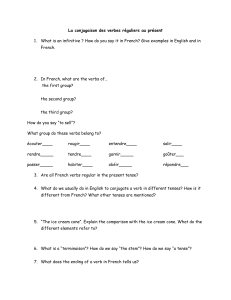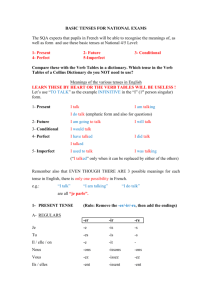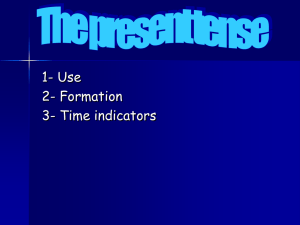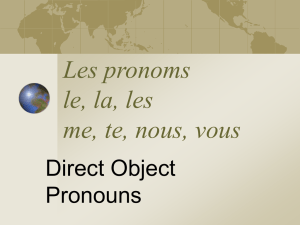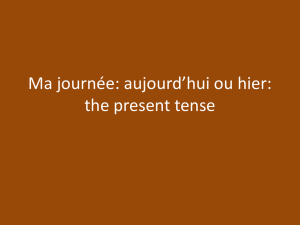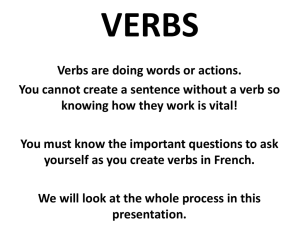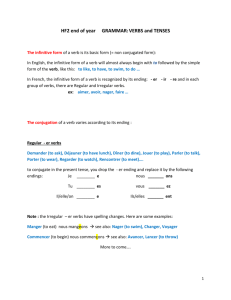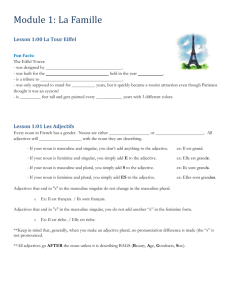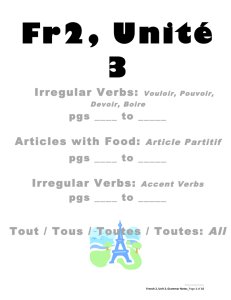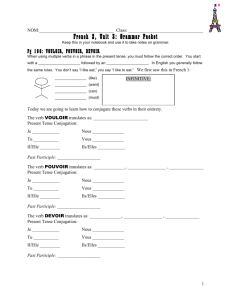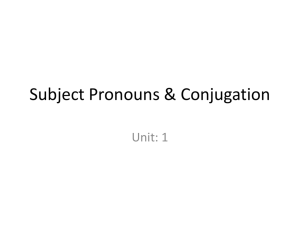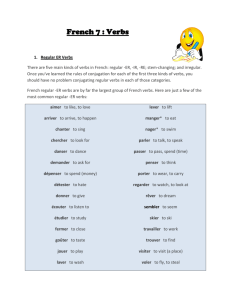Conjugating-ER-family
advertisement
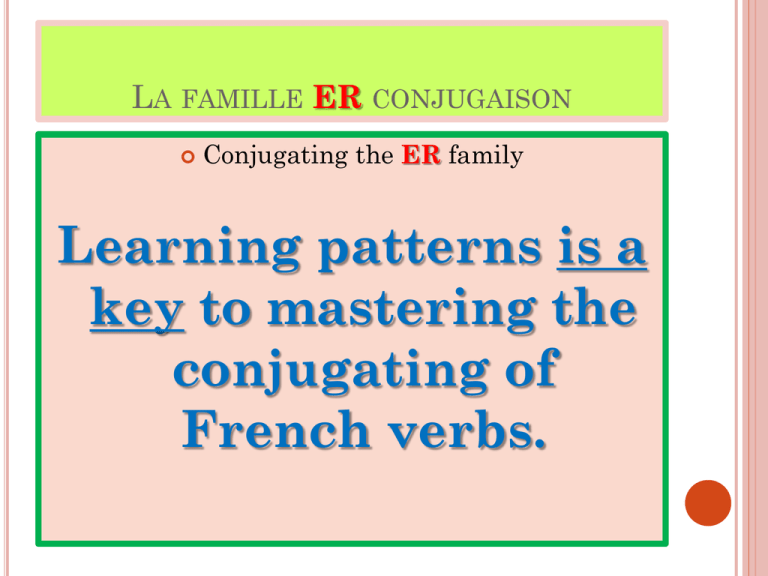
LA FAMILLE ER CONJUGAISON Conjugating the ER family Learning patterns is a key to mastering the conjugating of French verbs. SUBJECT PRONOUNS DOESN’T MATTER IF THE VERB IS REGULAR OR IRREGULAR: THE PRONOUNS ARE ALWAYS IN THE SAME ORDER. I You He, she, one We You They masculine & feminine Je Tu Il, elle,on Nous Vous Ils,elles REGULAR OR IRREGULAR? First, determine if the verb is irregular: 1) Know which are the irregulars. 2) They are usually common verbs. 3) They are unique (no pattern) & you have to study each one. The good news about REGULAR verbs: They only have one of three endings They follow a pattern. REGULAR VERBS: THE PATTERN EXPLAINED The infinitive of most verbs in French end in the letters Lesser numbers end in the letters Most follow a regular pattern for each “ending group” above. Exceptions to this pattern are called irregular verbs. ER. This is the family we are studying in this presentation. IR and RE. So if you learn the regular patterns you will know the patterns for most verbs. To conjugate each verb in the present tense, the last two letters (ER, IR, RE) are dropped and a different ending is added for each pronoun (I, you, he, she, it, we, you all, they). THE PATTERN FOR VERBS OF THE ER FAMILY 1) 2) 3) Put the pronouns in order. Find the stem of the verb by taking off the family name: ER Add your verb endings. Pronouns The stem: parler The ending Je parl e Tu parl es Il, elle, on parl e Nous parl ons Vous parl ez Ils, elles parl ent PARLER TAKE THE “ER” OFF AND REPLACE IT BY THE FOLLOWING ENDINGS: E ES E ONS EZ ENT video & prononciation Parler Je parle Tu parles Il parle Elle parle On parle Nous parlons Vous parlez Ils parlent Elles parlent AIMER Prononciation & video Aimer J’aime Tu aimes Il, elle, on aime Nous aimons Vous aimez Ils, elles aiment IRREGULAR ER VERBS Irregular Stems ►French stem-changing verbs are conjugated with the same endings as normal but have two different stems. Stemchanging verbs are sometimes called boot verbs. ►We will study the verbs acheter & préférer : Change of accent in the stem ►And the verbs manger & commencer: Add an “e” or a “ç” ►We will also meet Aller: the black sheep of the ER family! FIRST, 2 BOOT VERBS NOTE: È SOUNDS LIKE THE E IN ED OR MET. eter (to buy) Ach ète Tu achètes J’ach Préf érer (to prefer) préfère Tu préfères Il, elle, on Il, elle, on achète préfère Nous achetons Nous préférons Vous achetez Vous préférez Ils, elles achètent Ils, elles préfèrent Je WHY ARE THEY CALLED BOOT VERBS? The verb acheter is a so-called boot verb because all the verbs with the same stems form the shape of a boot. The verb: acheter è achètes achète ach te achetons achetez achètent e Another way of saying it : Nous and Vous look like their parents: ach ter TWO MORE EXCEPTIONS IN THE ER FAMILY. ger (to eat) Man Je mange Tu manges Il, elle, on mange Nous mangeons Vous mangez Ils, elles mangent Commen cer (to begin) Je commence Tu commences Il, elle, on commence Nous ç commen ons Vous commencez Ils, elles commencent IRREGULAR VERB ALLER prononciation & video Aller Je vais Tu vas Il va He goes Elle va On va Nous allons Vous allez Ils vont Elles vont Note: Aller is the only big exception in the ER family.

